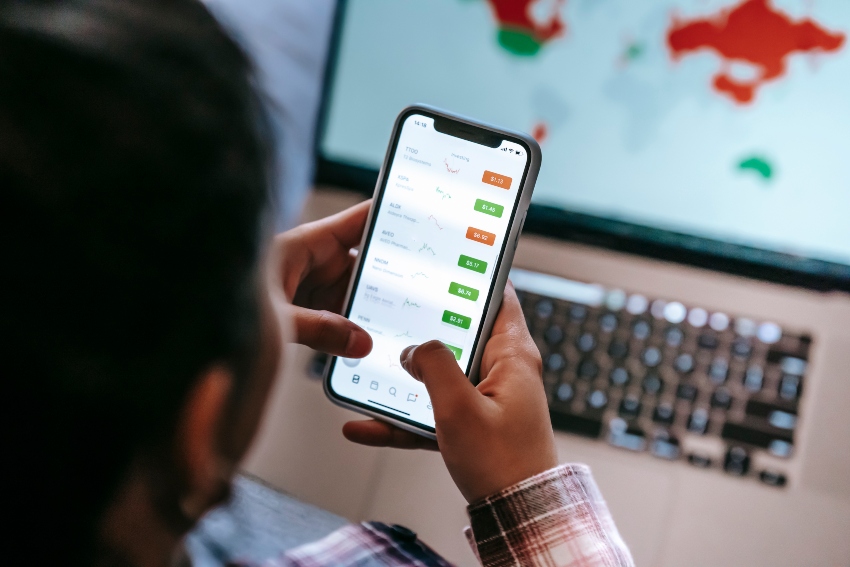Market Makers



Market makers play a key role in the financial markets as liquidity providers. By quoting both buy and sell prices for a particular asset, such as stocks or forex, they help fulfil orders. This article explains how market marker brokers work, including their benefits and drawbacks. We also list the top market makers in 2026.
Best Market Maker Brokers for United States



What is a Market Maker?
Market makers are entities such as hedge funds, investment companies and online brokers that act as counter-parties to trade requests. They are also known as liquidity providers because they set prices, fulfil orders and supply market depth for popular financial instruments.
Importantly, they post quotes for bid-ask spreads meaning they complete orders on both the buy-side and the sell-side. Market makers usually specialize in one or two securities, such as forex pairs, equities, ETFs or cryptocurrency.

Example Explained
The best way to demonstrate how market makers work and generate profits is through a straightforward example…
Let’s say a broker posts a bid-ask quote of $100-$100.10. Imagine you are selling 1,000 shares of stock X at $100 per share. The market maker purchases all 1,000 shares from you at this price. It will then sell all 1,000 shares for $100.10 to another investor.
This may seem like a pointless trade as there is only a $0.10 difference in share price. However, due to the volume, the trade generates a profit of $100 for the brokerage.
Rules & Exemptions
Market makers have to abide by strict rules and requirements created by associated exchanges and regulatory bodies. For example, firms linked to the New York Stock Exchange (NYSE) on Wall Street in the US must maintain capital greater than or equal to $100,000. Market makers associated with the London Stock Exchange (LSE) in the UK have obligations to post executable bid-ask quotes during 90% of regular trading hours. In addition, all quotes must be posted within the maximum allowed spread.
Market Makers Vs Market Dealers
Market makers and market dealers are similar in that both buy and sell at quoted prices. The key distinction is that in dealer markets, trades are executed over-the-counter (OTC) vs exchange trading with a maker. Because being linked to an exchange involves stricter requirements, market makers are held to a higher standard.
Market Makers Vs Market Takers
Market makers and market takers are the opposite sides of each trade, meaning takers purchase what a maker sells. If you are a market taker then a maker will trade against you. Market takers help to provide liquidity because they immediately fulfil the maker’s order. Often, takers are retail investors.
Market Makers Vs Clearing Houses
Clearing houses are essentially confirmation entities that help to uphold the integrity of a particular market. They are responsible for validating trades and ensuring that the security and capital are exchanged. They are used by exchanges for contracts such as options and futures, not just for transactions involving stocks and shares. A clearing house is used to finalize the trade between market makers and market takers.
Market Makers Vs ECN Brokers
ECN brokers do not typically set quotes for bid and ask spreads. They simply collect and pass along order book information to interested parties such as investors, banks and market makers. The main benefit of an ECN broker is access to wider order book information with multiple quotes so that you can pick the best price available with less risk of market manipulation. The result is tighter spreads and lower costs for investors.
Market Makers Vs Retail Traders
Market makers are different from retail traders in that they provide substantial liquidity and follow strict guidelines set out by regulators and exchanges. The key difference is that retail traders can pick and choose when to execute a trade whereas market makers must consistently post bid-ask spreads. As a retail trader, you can in effect make a market by quoting the bid-ask spread for a specific security on an order book.
Risks & Tricks
To help prevent market manipulation and insider trading, market makers are prohibited from messaging other market makers. There is a theory, however, that they often use penny stock orders as codes for communicating. Trade order volume is displayed as level 2 market data which corresponds to certain signals. For example, an order for 700 or 777 shares may indicate that the market maker is requesting the market be artificially inflated. An order of 911 could imply there is an upcoming news release. There are many websites that include a list of common signals and definitions for order volumes.
Artificial changes to the market are also commonly employed tricks. A market maker may adopt a stop hunting strategy, for example, where they aim to push the market down such that many stop losses are triggered, leading to a massive sale of assets. Let’s say an asset is currently valued at $102 – there will likely be several stop-loss orders placed just below $100. If the price falls past this point, then market makers can purchase many of the sold securities to increase their inventory.
There is also a risk of artificial increases to an asset’s value where a market maker places an order for a high volume of shares but withdraws the order once a fraction of those has been fulfilled. This momentary demand boosts the market, meaning the market maker can quote a wider bid-ask spread to turn more profit.
Getting Started
Comparing Brokers
There are many market maker brokers available. As a result, it is worth reviewing the various options to find the best provider. Some brokers, such as XM, are market makers, while others simply assign market makers. Examples of these include XTB and Kraken, which appoint e-market makers, meaning firms that focus on electronic trading.
Cost
Market maker brokers tend to follow a straightforward pricing model: a variable spread and/or a commission. Consider both elements to establish the full cost of trading. As a last resort, there are also some free brokers but they tend to offer wider, less competitive spreads. Importantly, opt for a provider with a transparent pricing schedule.
Trading Platforms
The trading platform is where you will access market information and place purchase and sell orders. It will form a key part of your trading experience. World-leading platforms, such as MetaTrader 4 (MT4) and MetaTrader 5 (MT5), are recommended for their breadth of charting options, dashboard indicators, customizable alerts and signals.
Note, if you are unsure how to customize your dashboard, you can find templates for MT4 and MT5 online to help review possible ideas.
Products
Another key consideration is the financial instruments you will be able to trade. Market makers typically focus on one or two securities, so if you want to invest in cryptos such as Bitcoin (BTC) and Ripple (XRP), you should avoid brokers that specialise in trading stocks and shares.

Regulation
The best market maker brokers are licensed by a recognized authority, such as the Investment Industry Regulatory Organization of Canada (IIROC) or the Cyprus Securities & Exchange Commission (CySEC). Regulation brings a level of trust for traders, suggesting that a broker is well run and adheres to relevant operating rules and legislation, such as negative balance protection. Using an unregulated, shady broker can be dangerous with potentially hidden fees and unfair withdrawal terms.
When comparing market maker brokers, you should also evaluate the security measures in place. Protocols such as two-factor authentication, for example, can help to keep your account safe.
Deposits & Withdrawals
The top market maker brokers offer fast and inexpensive methods for transferring funds between your bank and brokerage accounts. Most firms facilitate deposits and withdrawals via bank transfer, but you can also look for debit and credit card options as well as e-wallets, such as PayPal. Each broker should have a list of available finance methods along with any transaction limits and associated charges.
Customer Support
The best market maker brokers today offer an accessible support team. Customer service representatives are available 24/5 or 24/7 via email, telephone, live chat and social media channels, such as Twitter, Facebook or Telegram.
Pros
Benefits of trading with market maker brokers include:
- Deep liquidity in popular trading markets brings fast transaction times and less slippage
- Bid-ask spreads are sometimes fixed offering greater stability during periods of volatility
- Reliable order filling
- Hedge options
Cons
Downsides of trading with market maker brokers include:
- Risk of market manipulation
- Brokers trade against retail investors
- More expensive vs other online brokerages, such as ECN providers
- Fixed spreads mean there is less opportunity to capitalize on volatility
Are Market Makers Bad?
Market makers create deep liquidity with large inventories. This helps reduce volatility and create stability, which may appeal to beginner investors. On the downside, brokers often trade directly against their customers, creating a potential conflict of interest. In addition, there is a wider risk of market manipulation, though regulators are increasingly cracking down on unfair trading practices.
Use this guide to choose a market maker broker and start trading today.
FAQ
Do Market Makers Manipulate Stock Prices?
There is an accusation that market makers use their inventory to dictate the supply and demand of securities. There are many names for the different methods of influencing stock prices – try to learn what you can before you start trading. You should also learn how to recognize patterns and weekly cycles to avoid being exposed.
Do Market Makers Hold Stocks And Shares?
Yes – the top market maker brokers purchase, hold and sell stocks. A key part of providing liquidity is having an inventory to fulfil purchase orders.
Are Market Makers Legal And Regulated?
Market makers are legal and operate on exchanges worldwide, including the ASX in Australia, the HKEx in Hong Kong, the NSE in India and the TSX in Canada. Exchanges and regulatory bodies both impose strict rules to prevent market manipulation.
Do Market Makers Lose Money?
Yes – firms can lose money when the market declines after a broker fulfils a purchase order. Importantly, losses aren’t real until a sale order is fulfilled, so it is possible for the market to rebound and a loss to turn into a profit.
Do Market Makers Buy Options?
Market makers operate in most popular securities and assets, which includes being counter-parties to options contracts. Brokers help ensure that options contracts can be opened even if there is no entity prepared to take the opposing side of the trade. Options are particularly popular with investors looking to adopt delta neutral and gamma hedging strategies.
Is There A List Of The Top 5 U.S. Market Maker Brokers?
If you want to trade assets on the NASDAQ or NYSE, there are several market maker brokers to choose from. But what makes one platform better than another will depend on your preferences and objectives. While this is not an exhaustive list, top examples include FP Markets and Pepperstone. Note, brokers usually say which market makers they use, for example, Robinhood uses Citadel Securities, which is well known for its role in the 2021 GameStop trading frenzy.
